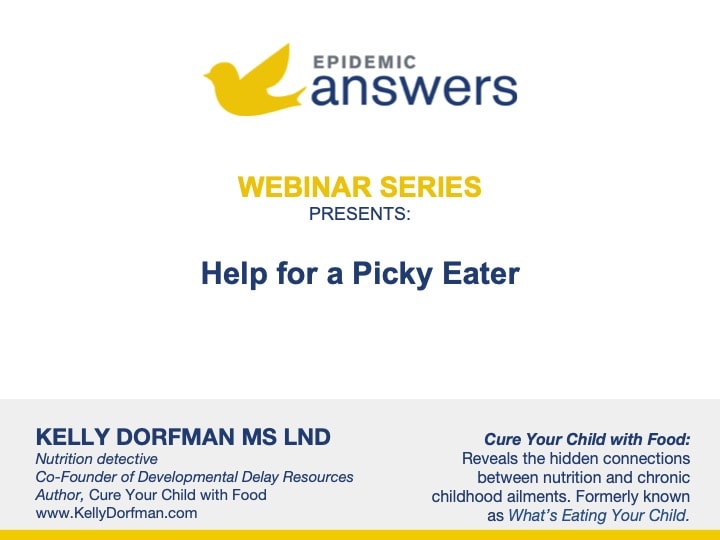In this post, Kelly Dorfman, MS, LDN explains how to get supplements into picky eaters.
Parents are justifiably alarmed when children are picky eaters. Inadequate and improper nutrient intake can decrease intelligence and affect brain functioning, especially during the first few years of life. Unfortunately, these indisputable facts are not enough to convince many children to eat their fruits and vegetables!
The best most parents can do is offer consistently good choices and eliminate the worst of the heavily processed, artificially colored and flavored foods. What often remains are foods like cereals and meal bars because many parents fear that children will eat nothing if the menu is adjusted any further.
One mother does not even keep vegetables in the house because the child reacts so negatively to the sight of them. “He reminds me of me,” she confessed sheepishly. She is not alone; fewer than one in four Americans eat five servings of fruits and vegetables per day.
Why Use Supplements for Picky Eaters?
Children who are distractible, have behavioral issues and developmental delays need more nutrients than non-affected youngsters. Their higher nutritional needs may be due to:
- Poor absorption of nutrients due to gastrointestional issues
- Self-restricted diets due to sensory processing issues or poor oral motor skills
- Restricted diets because of food reactions or allergies
- Genetic anomalies affecting their ability to detoxify environmental toxins
- High exposure to environmental chemicals and pollutants
One logical step is to close the nutritional gaps with the therapeutic use of nutritional supplements. Discuss your dietary supplement program with a doctor or other knowledgeable health professional. The right person can help you develop a good balance of nutrients for your child’s situation.
Are Supplements Safe?
Mixed messages in the media and from doctors themselves about which and how much supplements to take can be extremely confusing to parents. They often receive one set of instructions on nutrients and dosages from their practitioners, and dire warnings concerning toxicity of the same program from their pediatricians.
These conflicting messages reflect pervasive confusion and misinformation regarding supplements more than any real danger of toxicity. Nutrient supplements are regulated by the Food and Drug Administration (FDA) under the Dietary Supplement and Health Education Act (DSHEA).
While nutrients are generally well tolerated, and have a long history of safe and efficacious use, side effects and individual differences can occur. If you are uncomfortable with any supplement program, get a second opinion from a knowledgeable professional.
When a supplement program is too aggressive, a total program can be out of balance. A good rule of thumb to follow is: “When in doubt, take it out,” and then get further input. In addition, if you decide to give supplements to your child, start “low and slow”, that is, add in one supplement and then wait a day or two before adding in another.
Supplement Quality Is Important
In general, if you work with a practitioner who uses a root-cause approach such as a naturopath or functional-medicine practitioner, you’ll get high-quality supplements. This means that they don’t contain synthetic ingredients, whereas many supplements found in grocery stores, pharmacies and even in healthfood stores do.
An example of this is selenium. It’s commonly found as selenium selenite, which is a potentially toxic form of the mineral. Instead, a high-quality version would be L-selenomethionine.
In addition, you’ll want to avoid brands that contain artificial colors, artificial flavors and aspartame.
Getting Supplements In: Pills or Liquids?
Once a practitioner develops a supplement program for a child, the biggest challenge for most parents is getting it in. Most children under the age of nine cannot swallow pills. Furthermore, pulled-apart capsules can contain foul tasting, gritty powder.
If your supplement program involves pulling apart capsules, ask your health care provider for better tasting alternatives. Some children will take liquid supplements better if they are squirted in with a dropper or given in a small medicine cup that they can chase with straight juice. Better a small amount of weird flavored juice than an entire nasty cup.
For children on sugar-restricted diets, consider tea or lemonade sweetened with stevia.
Magnesium citrate is sour; many forms of magnesium have a sweeter taste, but magnesium glycinate is milder.
Hide Supplements in Food
Some supplements just taste yucky. A supplement that is fat based or gritty needs a thick, strong carrier, such as coconut yogurt, which does the trick as an excellent base. Fish oils and vitamin E are both well tolerated in yogurt.
Peanut and other nut butters (with or without jelly) are also good for hiding oily products. Maple syrup (poured on pancakes) and honey are excellent carrying agents for heavier substances.
Custom Compounding
For the most resistant cases, water-based supplements can be combined, custom flavored, and mixed by a compounding pharmacy. Custom formulations require a written order from a health professional familiar with compounding.
If you find yourself emptying out 10 or more capsules and are starting to feel like an amateur pharmacist, ask your health care professional if this alternative is available.
Treat Supplements as Essential Medicine for Picky Eaters
Supplements should not be optional; treat them as you would insulin for a diabetic. Children are much more agreeable when they sense the parents are serious.
Try “when:then.” “When you are done with your supplements, then we can play outside.” With creativity and persistence, most supplement programs can be successfully delivered to most picky eaters.
About Kelly Dorfman MS LND
Kelly Dorfman is one of the world’s foremost experts on using nutrition therapeutically to improve brain function, energy and mood. Kelly’s special talent for integrating information from many sources and finding practical solutions has made her a popular speaker and workshop leader. She lectures extensively and is a member of Platform (formerly the National Speakers Association) and has been featured on numerous television programs including CNN’s American Morning.
Kelly’s award winning book, Cure Your Child With Food: The Hidden Connection Between Nutrition and Childhood Ailments (formerly known as What’s Eating Your Child) was given rave reviews by Publishers Weekly and the Washington Post.

As a go-to expert on nutrition issues, Kelly is frequently interviewed and quoted in the media. She has been featured in articles in The Wall Street Journal, Parade, Bethesda magazine, Living Without magazine, and the Huffington Post.
Kelly holds a master’s degree in nutrition/biology and is a licensed nutrition dietitian. She is a co-founder of Developmental Delay Resources, which has merged with Epidemic Answers. You can find out more about Kelly and her practice at kellydorfman.com
Still Looking for Answers?
Visit the Epidemic Answers Practitioner Directory to find a practitioner near you.
Join us inside our online membership community for parents, Healing Together, where you’ll find even more healing resources, expert guidance, and a community to support you every step of your child’s healing journey.




